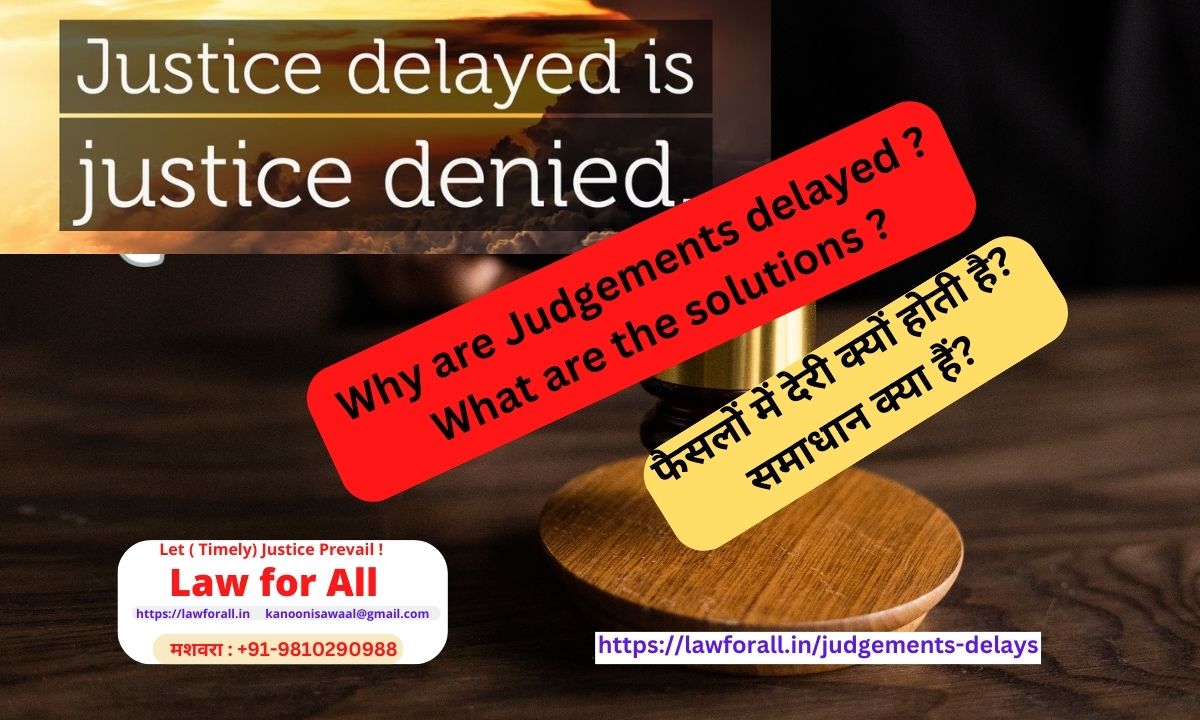Delays in Pronouncing Judgments in India
Justice delayed is Justice Denied. Oft said. Any effects ? Here is an actual experience for any interested.
Why do delays happen ?
Some say the fact of the matter is that EXCEPT the innocent litigant/victim, NONE of the others in the “system” – be it the lawyers, judges, and the opposite parties ( who know they are guilty) are interested in quick resolution. Indeed, their remuneration, power and profit depends upon cases being drawn out as much as possible ! No doubt there is a lot of logic in that !
But then the consequences are not hard to imagine. And frustrations against such a “system” are seen more and more frequently now.
Some of the other reasons of delays :
1) Procedural : Think multiple adjournments, hearings, and appeals, along with extensive paperwork and procedural intricacies at each step.
2) Technology : While this is improving , the pace is excruciatingly slow. There are still many, many courts where orders of the day are not regularly updated. And many times litigants are not even aware that an order has been passed for / against them ! Thus losing precious time for appeals etc.
3) Overburdened Courts : Walk into any court – particularly the lower courts in India and see for yourself ! The sheer volume of pending cases, ranging from civil to criminal matters, has led to a backlog that many courts struggle to manage effectively. The shortage of judges and supporting staff exacerbates this problem, contributing to prolonged waiting times for litigants.
Of course all these reasons feed off one another.
When delays happen, so do the following, almost concurrently !
1) Diminished Public Trust: When cases remain pending for years, trust is the first casualty. “Behind the scene dealings ” aspersions are cast. A litigant may even die awaiting judgement, and no one left to pursue the case further.Is this Justice ? This lack of trust undermines the credibility of the judiciary and may drive people towards alternative dispute resolution methods or even taking the law into their own hands.
2) Economic loss : Each hearing costs money, time and efforts ( the latter are also money !). All of which hinder not only the individual’s growth but even his organization’s and indeed the Nation’s
3) Harassment and Anguish : The toll delays take on the victim’s mental and emotional well-being cannot be put in numbers. Again, walk into any court and look at the elderly trudging from one place to another, files in hand, running after their lawyers etc.It is a pitiful sight !
4) Violation of the most Fundamental Right : Right to Justice is enshrined in our Constitution, though not explicitly set out. In fact all the six fundamental rights set out depend upon the Right To Justice as their basis ! But any right must impose corresponding duties too. Which seem to be painfully missing . Except on rare occasions when the Judiciary has taken note ( see excerpts later in this article.. ).
Solutions ? These are self-evident from above. These include :
1) Fast Track Courts: Particularly for vulnerable sections such as such as women, children, and senior citizens.
2) Legal Awareness : Awareness on legal rights, responsibilities and remedies may help reduce the number of frivolous cases, as well as enable the litigant to point out delays and thus help deliver quicker justice.
3) Exemplary, Visible Justice : Unfortunately, that does NOT happen in India. But that can prevent many other ” budding” criminals. But we believe in “reformatory” rather than ” retributive justice” . Does not seem to be working, imho. While systems who have retribution as a main pillar of justice seems to be doing much, much better.
4) Alternative Dispute Resolution (ADR)mechanisms : While some see it as a good solution, to me it is an admission of failure of existing means to cope ! Indeed these methods offer quicker resolutions and allow parties to have a more active role in the outcome of their disputes. But do they deliver Justice ?
5) Judicial Reforms : Which of course should be the most important aspect of any solution to this challenge. Right from increasing the number of judges and courts to match the workload, setting up specialized courts for specific case categories, and streamlining procedural complexities. And investing in modern technology.
To summarize, delays in pronouncing judgments in India’s judicial system are perhaps its greatest challenge. It needs immediate redressal if public public trust, individual rights, and the nation’s progress is to be had. A combination of judicial reforms, technological advancements, and alternative dispute resolution mechanisms is essential to create a legal system that is not only just but also efficient and responsive to the needs of its citizens.
What does the law and the judiciary say ?
In some Judicial Pronouncements Judges have been quick to vent their anguish as well as propose some possible resolutions. Various Procedural Codes also set the timelines out. But they have to be observed ! However, for what it is worth, I am repeating some here. Hopefully, it will help some !
” The Magistrate who cannot find time to write judgment within reasonable time after hearing arguments ought not do any judicial work at all. This Court strongly disapproves the Magistrates making such a tremendous delay in the delivery of his judgments. “
Another case, quoted in Anil Rai vs State Of Bihar, Appeal (crl.) 389 of 1998
“Nevertheless an unreasonable delay between hearing of arguments and delivery of judgment, unless explained by exceptional or extraordinary circumstances, is highly undesirable even when written arguments are submitted. It is not unlikely that some points which the litigant considers important may have escaped notice. But, what is more important is that litigants must have complete confidence in the results of litigation. This confidence tends to be shaken if there is excessive delay between hearing of arguments and delivery of judgments.Justice, as we have often observed, must not only be done but must manifestly appear to be done. “
– R. C. Sharma vs vs Union of India and Others, 1976 SCC (3) 574
“Code of Criminal Procedure. Sub- section (1) of Section 353 of the Code provides that the judgment in every trial in any criminal court of original jurisdiction, shall be pronounced in open court immediately after the conclusion of the trial or on some subsequent time for which due notice shall be given to the parties or their pleaders. The words “some subsequent time” mentioned in Section 353 contemplates the passing of the judgment without undue delay, as delay in the pronouncement of judgment is opposed to the principle of law. Such subsequent time can at the most be stretched to a period of six weeks and not beyond that time in any case. The pronouncement of judgments in the civil case should not be permitted to go beyond two months.”
– Anil Rai vs State Of Bihar, Appeal (crl.) 389 of 1998
What has been your experience dear reader ? What helped or did not help ? Comment in !
For any further queries and discussions, please see the the contact us page.
किसी भी प्रश्न और चर्चा के लिए कृपया हमसे संपर्क करें। यह पृष्ठ देखें।



